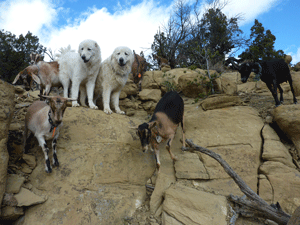By Elizabeth Wolf, Communications & Development Director, The Cornucopia Institute
 |
When Nancy Coonridge says she lives with her goat herd in the “wilds of New Mexico,” she’s not exaggerating. Coonridge Organic Goat Cheese Dairy perches at 8,000 feet elevation in the dry, rim rock country of western New Mexico, near the Continental Divide. The mailbox is two hours away by dirt road. The year’s water comes from rain and snow captured from the roof, electricity from solar panels. Cell phones don’t work here.
“When we say our goats are ‘free range’ we do not mean they have a pasture, however large. We mean there are no fences and no human neighbors for miles and miles,” Coonridge explains.
Raised in the San Francisco Bay Area in the 1960s, Nancy Coonridge suddenly realized at age 19 “I had to get a goat.” She got involved with several dairy goat cheese co-ops in California in the ’70s and taught herself the art of cheese making with the help of Mediterranean-trained cheese maestros living in the U.S. In the early ’80s, she and her then-husband bought 40 remote acres in New Mexico for the dairy, since expanded to over 300.
The herd—about 50 Alpine, Nubian, La Mancha and Oberhasli dairy goats—is free to roam it all. Each morning after milking, the goats go off to spend the day ranging in the stark high desert country. Maremma guardian dogs, bred for 2,000 years in the Italian Alps for wolf control, protect the herd from predators such as mountain lion, bear and coyote. At dusk the animals return to their barn and barnyard for the night. “Goats are homebodies and have a real homing instinct,” says Coonridge.
Browsing on brush, nettles, thistles, dandelions and other vegetation, the goats produce milk that is very high in fat and protein. Coonridge never feeds them grain, which upsets the animals’ ruminant function. During the winter or heavy rains the goats are given organic alfalfa hay in the barn to supplement their browse. Hormones, antibiotics and chemical wormers are absent on this dairy.
Certified organic since 1998, Coonridge Dairy sources most of the flavoring ingredients in the goat cheese, such as garlic, basil, herbs and green chile, from local, organic farmers. Their artisanal varieties include Herbs de Provence, Flame Roasted Green Chile, New Mexican Raspberry Jam, Hot Curry Delight, and Scarborough Fair with (you’ll know if you’re old enough) parsley, sage, rosemary and thyme.
Coonridge makes the cheese using traditional long set methods. The soft-spreading cheese, which comes in a glass jar, is covered with organic sunflower seed oil and herbs. “Watching that alchemy, that transformation of milk into curd into cheese is wonderful,” says Coonridge.
Hours from any urban area, the dairy ships product to a food hub distribution center in Albuquerque operated by La Montanita Co-op and distributes to co-op grocers. Coonridge also sells at festivals and farmers markets throughout the greater Southwest and partners with New Mexico’s 17 wineries. Online customers make up about 10% of sales.
The operation may be in the wilds of New Mexico but it attracts volunteers from around the world. In addition to Nancy and her husband, Paul Owen, “there are always two or three other people here,” says Coonridge. “In the last five years we’ve had an upswing of WWOOFers and interns. It’s wonderful to be around that young, idealistic energy.” (WWOOF is Worldwide Opportunities on Organic Farms, www.wwoofusa.org.)
Coonridge and her crew are building a new structure on the property to expand their cheese-making capacity and offer classes. “There’s a real sense of place here,” she says. “It’s the culmination of so many different things coming together: the goats, the cheese, living in harmony with nature. For me personally, I can’t think of anything else that would be as deeply satisfying.”
Contact info: Coonridge Organic Goat Cheese Dairy, Pie Town, New Mexico, www.coonridge.com, (888) 410-8433
This story originally appeared in The Cultivator, The Cornucopia Institute’s quarterly print publication available to members and online.
The post No Fences appeared first on Cornucopia Institute.